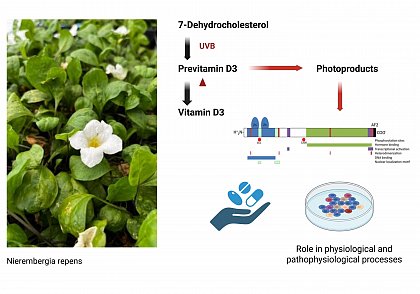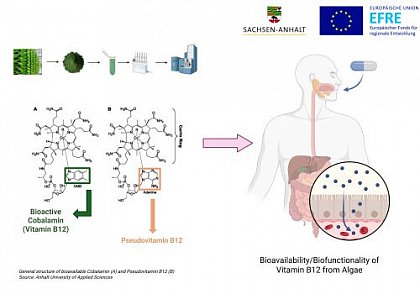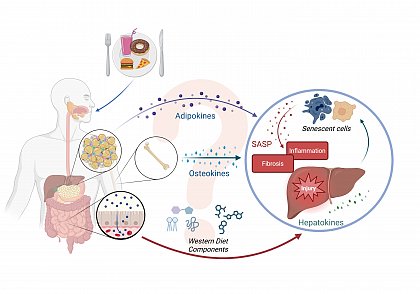Projects
1. Tachysterol – a UVB-Secosteroid in Foods: Effects on Calcium and Bone Metabolism (DFG Project)
Duration: 04/2023–03/2026
Tachysterol is a by-product of UVB light–mediated vitamin D synthesis. This project aims to investigate whether photoproducts such as tachysterol exhibit vitamin D activity and thereby influence calcium and bone metabolism. Using a Cyp27b1 knockout mouse model characterized by calcitriol deficiency, we will assess the potential of tachysterol to normalize hypocalcemia and improve bone mineralization. In collaboration with Prof. Dr. Reinhold Erben (Ludwig Boltzmann Institute for Osteology, Vienna), biomechanical properties of bone will also be analyzed. The primary focus is to identify the molecular mechanism of action and potency of tachysterol in comparison to vitamin D. Using various cell models and RNA interference techniques, we will investigate which endogenous modifications of tachysterol are required for its effects and the role of the vitamin D receptor.
2. DiPlanD – Sustainably Produced, Vegan Vitamin D₃ and Cholesterol from Nierembergia repens (BMBF Project)
Duration: 04/2024–12/2028
DiPlanD is a collaborative project within the BMBF-funded initiative “Digitalization of Plant Value Chains” (DIP) in Saxony-Anhalt – Model Region for the Bioeconomy. The goal is to produce plant-derived vitamin D₃ and cholesterol using sustainable, energy-efficient resources and digitally controlled UVB light reactors. DiPlanD establishes the foundation for the economic utilization of Nierembergia repens (trailing cupflower), a plant species previously used exclusively for ornamental purposes, as a raw material source for biofunctional sterols in the southern Saxony-Anhalt model region. It thereby contributes to the further development and diversification of biofunctional value chains in the field of health-promoting medicinal plants.
The Human Nutrition Group coordinates the DiPlanD consortium and investigates the pharmaceutical potential of photoproducts generated during vitamin D synthesis. The consortium integrates expertise in natural products and medicinal chemistry, plant breeding, biotechnology, digital measurement and control systems, agricultural and nutritional sciences, as well as techno-economics and management.

3. DiPisum – Digitalization-Driven Development of Saxony-Anhalt into an Innovation Hub for Pea Breeding, Cultivation, and Processing (BMBF Project)
Duration: 04/2024–12/2028
The Human Nutrition Group is a partner in the DiPisum consortium, which focuses on breeding, cultivating, and processing peas for emerging markets to ensure the supply of protein-rich foods in the Central German mining region (“Mitteldeutsches Revier”) of Saxony-Anhalt. Our group’s main contribution is the investigation of biofunctional properties of proteins and peptides from peas relevant to human health.
4. VitAL – The Green Alga Chlorella and Its Associated Microflora: A Natural Vitamin B₁₂ Source for Vegan Nutrition (EFRE Project)
Duration: 10/2024–12/2027
Vitamin B₁₂ is essential for blood cell formation and the maintenance of neuronal function. Since it is predominantly found in animal-derived foods, individuals following vegetarian or vegan diets are particularly susceptible to vitamin B₁₂ deficiency. Currently, vitamin B₁₂ in dietary supplements is produced exclusively via genetically modified bacterial strains.
The green alga Chlorella is capable of absorbing and storing vitamin B₁₂ from symbiotic bacteria, making it a promising alternative and sustainable source of the vitamin. The aim of VitAL is to develop a CO₂-fixing cultivation process for Chlorella and its associated bacterial microflora for the cost-effective production of B₁₂-enriched biomass, as well as to formulate bioavailable vitamin B₁₂ preparations. The Human Nutrition Group, in collaboration with Köthen University of Applied Sciences, focuses on testing the bioavailability and efficacy of so-called pseudo-vitamin B₁₂ derivatives in suitable in vitro and in vivo systems.

VitAL (Created with BioRender)
5. MikroViDA – Influence of the Skin–Gut Microbiome on Vitamin D Metabolism (EFRE Project)
Duration: 03/2024–12/2027
MikroViDA investigates the interplay between skin cells, subcutaneous adipose tissue, and the skin microbiome in vitamin D metabolism. The project aims to identify specific bacterial species that modify the synthesis and metabolism of vitamin D vitamers. Furthermore, it will establish cell models and co-cultures to study interactions between skin bacteria, skin cells, and subcutaneous adipocytes in greater detail. These investigations will form the basis for evaluating the efficacy of probiotic formulations to improve vitamin D status and skin health.
6. Thera4Age – Innovative Therapeutic Concepts for Age-Associated Diseases (EFRE Project)
Duration: 01/2025–12/2027
The Human Nutrition Group is a partner in the Thera4Age consortium, which focuses on optimizing therapeutic strategies and translating them to address highly complex cellular deficits in age-associated diseases. Working in tandem with the Experimental Pharmacology Group (Prof. Dr. Sonja Kessler), our research targets liver diseases and therapies. We specifically investigate dietary factors influencing the development of hepatocellular senescence and metabolic disturbances that may, in turn, affect the activity of hepatic stellate cells and their fibrogenic potential.

7. GlycoPEP – Development of Tailored Glycopeptides from Milk to Prevent Age-Associated Diseases (EFRE Project)
Duration: 03/2025–12/2027
With demographic aging, food-based nutritional strategies for healthy aging are gaining importance. Milk proteins possess promising health potential, but this is currently underutilized. The main objective of GlycoPEP is to enhance the value creation from glycosylated milk peptide fractions. Novel glycosylated milk peptides will be isolated, characterized, and evaluated in model systems and human studies for their efficacy and preventive potential, with particular attention to the physiological relevance of sialic acids. The Human Nutrition Group focuses on assessing the bioavailability and biofunctionality of glycopeptides in cell systems, with a special emphasis on characterizing the glycosylated growth factor FGF23 in milk and elucidating its biological significance.
Jump directly to: To the beginning of the text (Jump over the navigation) , Main navigation , Themes navigation , Up




